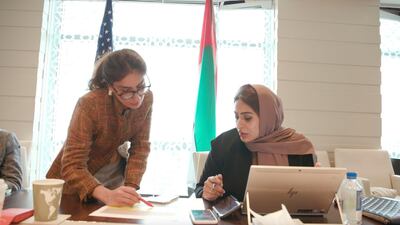For the past few weeks the UAE Embassy and consulates in the United States have been in a race to ensure the safety of more than 4,000 Emiratis in the country and send them home as the number of US coronavirus cases soars.
A ‘war room’-type operation was launched at the UAE Embassy in Washington and at consulates in New York, Texas and California. Diplomats whose normal duty is to manage relations and ties with the US have been working round the clock to repatriate their citizens.
On March 17, the UAE called on all Emiratis to return, and it has since increased restrictions on people entering and leaving the country to contain the spread of the virus.
Meanwhile, the number of coronavirus cases in the US has crossed 100,000, taking it past China and Italy as the worst-affected country. States such as New York and California, home to many Emirati students, patients and tourists, have been hit hard by the virus.
With the majority of the 4,200 Emiratis in the US already sent home, the Embassy is doubling its efforts to get the few hundred who remain in the country out by this week. Two special flights are set to leave before the end of the month.
Emiratis in the US requiring repatriation comprise two main groups: about 1,600 students and about 2,500 patients and their carers. The flights will also carry about US citizens who work in the UAE or whose families live there.
The embassy set up a website and hotline to explain and expedite the process, and is organising flights and other logistical support for their return, paid for by the government.
But not everyone will be able to return at the same time. Students have an easier process that entails co-ordination with their universities, dormitories and the State Department if necessary. But patients, some of whom are receiving urgent care, may not be able to travel.
“We are handling those situations on a case-by-case basis and will continue to provide all support needed to ensure their health and well-being,” said Shaima Gargash, deputy chief of mission at the UAE Embassy in Washington.
Other challenges are posed by the uncertainty surrounding the pandemic and its rapid spread.
"This is a very aggressive and continuously evolving health crisis … policies and regulations in the UAE and other nations are changing to keep pace and minimise the spread of the novel coronavirus," Ms Gargash told The National.
Co-ordination with the US side has been ongoing at all levels. US Secretary of State Mike Pompeo called Sheikh Mohamed bin Zayed, the Crown Prince of Abu Dhabi and Deputy Supreme Commander of the UAE Armed Forces, on Wednesday, and diplomats are in touch daily with different US departments.
Marcelle Wahba, president emeritus at the Arab Gulf States Institute in Washington and a former US ambassador to the UAE, said any such effort entails a large amount of resources.
"With US universities and many businesses closing due to coronavirus, the UAE government is taking on the challenging task to repatriate its citizens … they have the know-how and the resources," Ms Wahba told The National.
The resources would be “both commercial and military to organise this important undertaking, as we have seen their earlier repatriation of Emiratis, as well as other Arab citizens, out of China,” she said.
With Covid-19 cases increasing across the globe, and many US universities cancelling on-campus classes until the autumn semester, it is unclear when the Emiratis who are returning home will return to the United States.


